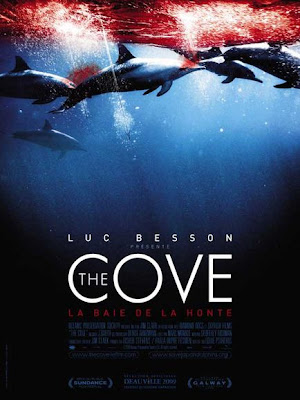 This movie is not a regular documentary involved in protection of the environment or the endangered species. It is indeed an action documentary (not exactly à la Hara Kazuo but I wanted to use the expression here), with a whole "commando" of (american) men and women trying to show and spread to the world the hideous and hidden truth about a small (japanese) community of animal murderers (that is murderers OF animals), covered by a whole bunch of officials and politicians. Yes, it might sound strange to some of us : this is NOT fiction and yet the good guys are american ! (just kidding...)
This movie is not a regular documentary involved in protection of the environment or the endangered species. It is indeed an action documentary (not exactly à la Hara Kazuo but I wanted to use the expression here), with a whole "commando" of (american) men and women trying to show and spread to the world the hideous and hidden truth about a small (japanese) community of animal murderers (that is murderers OF animals), covered by a whole bunch of officials and politicians. Yes, it might sound strange to some of us : this is NOT fiction and yet the good guys are american ! (just kidding...)Well, in fact, the good guys might be anyone watching this movie and showing the slightest political reaction - something Japanese people are not always very good at, but let's hope they will, this time, actually do something, anything (please...).
And above all, it shows how - only ? - passion can really change things in a world where politics are solely a matter of dispassionate businessmen.
Maybe, if I had to be _nerder_ there, two things lacked in this film - but it does not prevent it from being a masterpiece documentary !
Firstly perhaps, an explanation about the fact that iruka ("dolphin" in japanese) can be written with several chinese ideograms : 海豚 (which means "sea pork"...), or 鯆 (an ideogram that, as the one for "whale", kujira 鯨, is compound with the radical of the fish on the left : 魚, thus classifying those intelligent mammals as mere fishes...).
Secondly, I was wondering how this so-called "tradition" (fishing dolphins by slaughtering them) might be a good thing for yakuza. The japanese mafia is mentioned only once in the movie. Still, aren't those fishermen involved in any criminal organisation bigger than just their little town of Taiji PLUS the japanese government's interests in struggling against the rest of the world ? Tradition and nationalism being a huge part of the yakuza spirit, I just wondered if the film crew did not develop the idea furthermore 1) because this very idea was foolish, or 2) because it would be foolhardy to pursue an enquiry involving the yakuza ?
I would like to add here that, even without recalling the numbers exactly, it seems that the biggest part (like, two thirds or so) of the fish stocks bought everyday for the restaurants in the Consumption Empire of Japan, are just not consumed at all, then dumped daily, consequently WASTED daily, and therefore destroying the planet twice or thrice faster than "normal" fishing...
Finally I would just add, as a good "green" nerd, that this movie is no exception to the rule stipulating that any documentary made after "Koyaanisqatsi" (that is to say since 1982) has to feature a fast-motion scene.
PS : I am actually glad to see that Luc Besson, one of the WORST popular director in french cinema, who according to me wrote only two good movies in his whole career ("Leon" and "Taken"), now seeks to buy himself a consciousness by distributing very good documentaries such as "Home" or "The Cove" with his production company Europa Corp.





